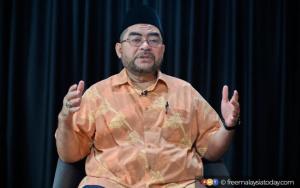Amanah will steer clear of PAS’s populist strategies, says Mujahid

Amanah will not go down the same path as PAS in embracing a populist stance and using unethical undertones to sway Malay-Muslim voters, says its vice-president Mujahid Yusof.
(FMT) – In an interview with FMT, Mujahid said the Pakatan Harapan (PH) component remains committed to upholding positive values that resonate with the country’s diverse fabric.
He said these values include the concept of “mercy to all creations” (rahmatan lil alamin), fostering compassion and understanding among citizens, and nurturing an appreciation for the environment.
“PAS, with its populist approach, attempts to convey that it alone champions Islam in the country, even as it resorts to slander,” Mujahid said.
“Their approach lacks civility, and this is evident from their exploitation of issues involving the shariah courts, such as the Nik Elin matter (Kelantan’s Sharia enactment challenge), as well as the Jill Ireland case (on the use of the term “Allah”).
“Such tactics are PAS’s lifeline for survival and its appeal to populism.”
Mujahid was commenting on why Amanah would refrain from adopting populist agendas and narratives involving Malay Muslims, unlike the Islamic party which did so and achieved good results in GE15 and the state elections in six states.
For the record, PAS, which is part of Perikatan Nasional (PN), won 43 parliamentary seats in GE15, the most number of seats it has ever held in the Dewan Rakyat. Its achievement was also dubbed a “green wave” by many political observers.
In the polls that took place in six states last August, PAS not only retained its control of the Kedah, Kelantan, and Terengganu state governments but also won in Perlis, a Barisan Nasional (BN) stronghold.
Meanwhile, Amanah experienced a setback by winning only eight parliamentary seats in GE15, with Mujahid failing to defend the Parit Buntar constituency.
Reflecting on the year-long collaboration with Umno, Mujahid admitted there were some limitations, especially at the grassroots level, as they have not been able to seriously implement joint programmes in their respective areas.
“We must overcome this issue by actively engaging in more grassroots programmes.
“Not all programmes have been jointly organised, but most of them tend to wait for instructions. It’s understandable, given our history of not having collaborated before. Some guidance must be provided (to strengthen the relationship),” he said.

